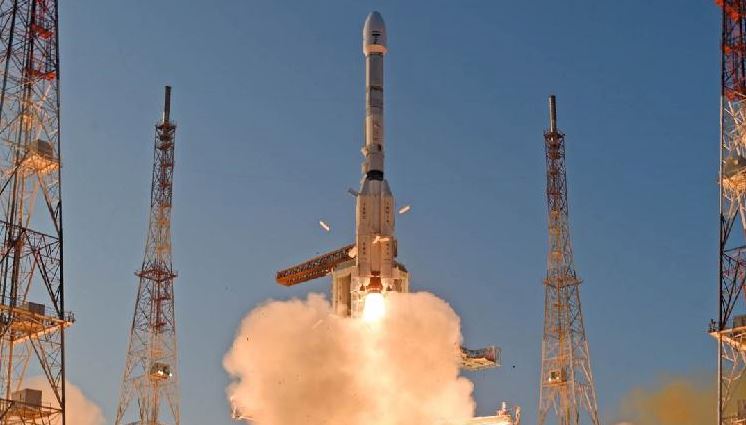Chennai: After being a major atomic power generation hub, Tamil Nadu is all set to become a major space centre in the country, with the presence of rocket/ satellite makers, rocket port, space propellant park, Defence corridor and aerospace park. Prime Minister Narendra Modi on February 28 will remotely lay the foundation stone for India’s second rocket port to be built at Kulasekarapattinam during his visit to Tuticorin District, said a senior official of the Indian Space Research Organisation (ISRO) on Monday. ISRO is building a rocket port at Kulasekarapattinam from where small rockets laden with small satellites can be launched. ISRO currently has the Small Satellite Launch Vehicle (SSLV) rocket with a carrying capacity of 500 kg. The proposed rocket port is also expected to cater to the launch needs of private rocket makers. Major space faring nations have multiple rocket launch sites. At present, India has one rocket port at Sriharikota in Andhra Pradesh with two launch pads. “A rocket launch site should be on the east coast and near the Equator. And Tuticorin District satisfies that condition,” a former ISRO official told IANS. Tuticorin District is a good location for a rocket that needs to fly towards the south and proximity to the sea is also important. As a matter of fact, long ago Tuticorin was considered for locating a rocket launch site. India’s Earth observation or remote sensing satellites are flown southwards. The rockets flown from the Sriharikota rocket port in Andhra Pradesh to put satellites into the Polar orbit are not able to fly straight southwards as they have to go around Sri Lanka, resulting in higher fuel spend. On the other hand, a straight path will result in lower fuel consumption which in turn enables the rocket to carry heavier satellites, ISRO officials said. Former Director of ISRO, M Annadurai had told IANS, “Given the trend of launching a constellation of small satellites, the entry of small rockets – from ISRO and private players – coupled with the rocket port in Kulasekarapattinam, Tamil Nadu can become a global space sector hub.” “Additionally, through the UN Office for Outer Space Affairs (UNOOSA), ISRO has taken the initiative to showcase to the non-space faring nations its space capabilities and also provide training to build small satellites. Those nations are interested in remote sensing satellites for their needs. “There is a strong possibility of the first set of satellites being made and launched into orbit by India. “Further the Defence corridor and increased drone manufacturing and usage will beef up the ecosystem for making small satellites in Tamil Nadu,” Annadurai added. Indian private and government rocket companies can offer cost-effective launch services, as Kulasekarapattinam is an ideal location for putting a satellite into polar orbit since it is located on the east coast and is near the Equator. With ISRO setting up its second rocket port in Kulasekarapattinam, the Tamil Nadu Government has announced that it will set up a new Space Industrial and Propellant Park near Tuticorin District on an area of 2,000 acres. The proposed park will be set up by Tamil Nadu Industrial Development Corporation Ltd (TIDCC). Already industrial units in Chennai, Coimbatore and other places in Tamil Nadu have been supplying components for ISRO. Private rocket maker Agnikul Cosmos Private Ltd is based in Chennai. The Prime Minister will also inaugurate ISRO’s Semicryogenics Integrated Engine and Stage Test facility at ISRO Propulsion Complex at Mahendragiri during his visit to Kerala. The new facility will enable development of semi cryogenic engines and stages which will increase the payload capability of ISRO’s current rockets. The facility is equipped with liquid oxygen and kerosene supply systems to test engines up to 200 tonnes of thrust. Be that as it may, in the atomic power sector, Tamil Nadu currently has 2,440 MW commercial generation capacity out which 2,220 MW are operation (2,000 MW in Kudankulam and 440 MW at Kalpakkam) and one 220 MW plant at Madras Atomic Power Station (MAPS) is under maintenance since 2018. The unit is expected to be operational from April 1, 2024. That apart, another 4,000 MW of atomic power is being added in Kudankulam. According to the Department of Atomic Energy (DAE), the integrated commissioning of the 500 MW Prototype Fast Breeder Reactor (PFBR) is in an advanced stage. Two more 500 MW fast breeder reactors at Kalpakkam are being planned. Recently the Prime Minister dedicated to the nation a Rs 400 crore Demonstration Fast Reactor Fuel Reprocessing Plant (DFRP), at the Indira Gandhi Centre for Atomic Research (IGCAR), at Kalpakkam. The Fast Reactor Fuel Cycle Facility (FRFCF), being set up in Kalpakkam near here, is expected to be completed by December 2027. The FRFCF project is executed by the Nuclear Recycle Board, Bhabha Atomic Research Centre and the DAE. Originally budgeted at about Rs 9,600 crore, the purpose of the FRFCF is to reprocess the spent fuel of the fast breeder reactors.
Indian private and government rocket companies can offer cost-effective launch services, as Kulasekarapattinam is an ideal location for putting a satellite into polar orbit since it is located on the east coast and is near the Equator. With ISRO setting up its second rocket port in Kulasekarapattinam, the Tamil Nadu Government has announced that it will set up a new Space Industrial and Propellant Park near Tuticorin District on an area of 2,000 acres. The proposed park will be set up by Tamil Nadu Industrial Development Corporation Ltd (TIDCC). Already industrial units in Chennai, Coimbatore and other places in Tamil Nadu have been supplying components for ISRO. Private rocket maker Agnikul Cosmos Private Ltd is based in Chennai. The Prime Minister will also inaugurate ISRO’s Semicryogenics Integrated Engine and Stage Test facility at ISRO Propulsion Complex at Mahendragiri during his visit to Kerala. The new facility will enable development of semi cryogenic engines and stages which will increase the payload capability of ISRO’s current rockets. The facility is equipped with liquid oxygen and kerosene supply systems to test engines up to 200 tonnes of thrust. Be that as it may, in the atomic power sector, Tamil Nadu currently has 2,440 MW commercial generation capacity out which 2,220 MW are operation (2,000 MW in Kudankulam and 440 MW at Kalpakkam) and one 220 MW plant at Madras Atomic Power Station (MAPS) is under maintenance since 2018. The unit is expected to be operational from April 1, 2024. That apart, another 4,000 MW of atomic power is being added in Kudankulam. According to the Department of Atomic Energy (DAE), the integrated commissioning of the 500 MW Prototype Fast Breeder Reactor (PFBR) is in an advanced stage. Two more 500 MW fast breeder reactors at Kalpakkam are being planned. Recently the Prime Minister dedicated to the nation a Rs 400 crore Demonstration Fast Reactor Fuel Reprocessing Plant (DFRP), at the Indira Gandhi Centre for Atomic Research (IGCAR), at Kalpakkam. The Fast Reactor Fuel Cycle Facility (FRFCF), being set up in Kalpakkam near here, is expected to be completed by December 2027. The FRFCF project is executed by the Nuclear Recycle Board, Bhabha Atomic Research Centre and the DAE. Originally budgeted at about Rs 9,600 crore, the purpose of the FRFCF is to reprocess the spent fuel of the fast breeder reactors.

AfterAtomic Power Hub, TN Set to Become Major Space Centre










Escort Sakarya Bayan Birbirinden güzel kadınlarla alakadar ne ararsanız bulabileceğiniz Bayan arkadaş arama sayfası sizin için 24 saat hizmet sunar.
Nice post. I was checking constantly this blog and I am
impressed! Very useful info specially the last part 🙂
I care for such information much. I was seeking this particular info for a long time.
Thank you and good luck.
Everything is very open with a precise explanation of the
challenges. It was definitely informative. Your website is very useful.
Many thanks for sharing!
I’m extremely impressed with your writing skills and also with
the layout on your blog. Is this a paid theme or did you customize
it yourself? Anyway keep up the nice quality writing, it is rare
to see a great blog like this one these days.
If some one wishes to be updated with most up-to-date technologies after that he must be pay a visit this website and be up to
date all the time.
Definitely believe that which you said. Your favorite reason appeared to be on the web
the simplest thing to be aware of. I say to you, I certainly get irked while
people consider worries that they just do not know about.
You managed to hit the nail upon the top as well as defined out the whole thing without having side effect , people could take a signal.
Will probably be back to get more. Thanks
Thanks for a marvelous posting! I certainly enjoyed reading it, you’re a great author.
I will make sure to bookmark your blog and will often come
back from now on. I want to encourage you continue your great writing, have a nice
holiday weekend!
Wonderful, what a weblog it is! This website gives valuable information to us,
keep it up.
May I simply just say what a relief to uncover somebody that really
understands what they are discussing online. You actually realize how to bring an issue to light and make it important.
More and more people ought to look at this and understand this side of the story.
I can’t believe you aren’t more popular given that you surely
possess the gift.
I have read so many content about the blogger lovers except this post is in fact a
fastidious article, keep it up.
Excellent article! We are linking to this great content on our site.
Keep up the great writing.
Hi there! I could have sworn I’ve visited this website before but after looking
at some of the articles I realized it’s new to me.
Nonetheless, I’m definitely pleased I found it and I’ll be book-marking it and checking back often!
My brother recommended I might like this blog. He was totally right.
This post actually made my day. You can not imagine simply how much time
I had spent for this info! Thanks!
Wow, this article is pleasant, my sister is analyzing these things, so I
am going to inform her.
Magnificent goods from you, man. I have understand your stuff previous to and you are
just extremely wonderful. I actually like what you have acquired here, certainly like what you are saying and the way
in which you say it. You make it entertaining and you still take care of to keep it smart.
I cant wait to read much more from you. This is actually a tremendous website.
Hi to all, the contents existing at this web page are in fact
remarkable for people experience, well, keep up the good work fellows.
This blog was… how do you say it? Relevant!!
Finally I’ve found something which helped me. Cheers!
Every weekend i used to pay a quick visit this site, for the reason that i wish for
enjoyment, as this this website conations actually good funny material too.
There’s definately a lot to know about this issue. I like all of the points you’ve made.
It’s really a cool and helpful piece of information. I’m satisfied that you just shared this helpful info with us.
Please keep us up to date like this. Thanks for sharing.
Do you mind if I quote a couple of your articles as long as I provide credit
and sources back to your weblog? My blog is in the
very same niche as yours and my users would certainly benefit from some of the information you provide here.
Please let me know if this alright with you.
Cheers!
Does your blog have a contact page? I’m having a tough time locating it but, I’d like to shoot you an e-mail.
I’ve got some ideas for your blog you might
be interested in hearing. Either way, great blog and I look
forward to seeing it develop over time.
Hi, everything is going nicely here and ofcourse every one is sharing information, that’s truly excellent, keep up
writing.
I pay a quick visit everyday some sites and websites to read articles or reviews,
except this web site provides quality based writing.
Very shortly this website will be famous among all blog viewers, due to
it’s pleasant articles
It’s appropriate time to make some plans for the future and it is time to be happy.
I have read this post and if I could I desire to suggest you few interesting things or suggestions.
Perhaps you can write next articles referring to this article.
I wish to read even more things about it!
Spot on with this write-up, I really feel this amazing site needs
a lot more attention. I’ll probably be returning to read more, thanks for the information!
If some one desires to be updated with newest technologies then he must be pay a quick visit
this site and be up to date every day.
Die meisten dieser Plattformen bieten verschiedene Zahlungsmethoden für Investitionen in BTC an. Entscheide dich für die bequemste und folge den Anweisungen für die Einzahlung.
No matter what strokes you are searching for, RedTube will satisfy the carnal sex instincts of your reptile brain. While you might think a glans
piercing will elicit the most pleasure, it’s not without the risk of nerve damage to the delicate part
just from the procedure, even if it’s done correctly.
You Will Beg Me To Link You To This Video.
So just feel yourself at home and start browsing
our constantly updating vast archive of porno graphic materials,
or create a profile, save and share your favorite porno flicks and get in contact with other porno
video lovers. They are always spotlessly clean, and if
they have a scratch on their body – of which they get many traveling the thorny roads –
they do not go outside their village until entirely
healed. Why Do I Get Cramps After Sex? Read why one woman is campaigning to save the Eighth
Amendment.
Thank you, I’ve just been searching for info about this subject for ages and yours is
the best I have found out so far. However, what in regards to the conclusion? Are you positive concerning
the source?
Helpful information. Fortunate me I discovered your
web site unintentionally, and I’m stunned why this
accident did not came about in advance! I bookmarked it.
Why users still use to read news papers when in this technological globe all is presented on net?
Hello, I want to subscribe for this website to obtain newest updates,
therefore where can i do it please help out.
This design is wicked! You certainly know how to keep a reader amused.
Between your wit and your videos, I was almost moved to start my own blog
(well, almost…HaHa!) Fantastic job. I
really loved what you had to say, and more than that,
how you presented it. Too cool!
I am truly pleased to glance at this webpage posts which contains tons of useful
facts, thanks for providing such information.
Howdy! Do you use Twitter? I’d like to follow you if that would
be okay. I’m undoubtedly enjoying your blog
and look forward to new posts.
Clubbing it with our discount coupon code offers you an even lower rate on an already lower price.
Here is my site :: https://putters.hu/hello-world/
Among them is, you can make use of GSA Search Engine Ranker to select public proxies from all various kind of websites on automatic.
Also visit my blog post: https://au.fpfootwear.com/2024/01/21/truth-in-advertising-part-1/
Among the alternatives for a new project is to import target URLS and you can do that from a previous site checklist.
My web blog … https://sitenovo.sindservjaguariuna.com.br/campanha-salarial-proxima-reuniao-da-mesa-de-negociacao-sera-dia-28-as-15-horas-esperamos-por-avancos/
Hello, i feel that i saw you visited my website thus
i came to return the favor?.I’m attempting to find things to enhance
my website!I assume its adequate to use some of your ideas!!
My partner and I stumbled over here coming from a different
page and thought I may as well check things out.
I like what I see so now i am following you.
Look forward to exploring your web page again.
Good way of telling, and fastidious article to obtain information about
my presentation subject, which i am going to
deliver in school.
Undeniably believe that which you said. Your favorite justification appeared to
be on the web the simplest thing to be aware of.
I say to you, I definitely get irked while people consider worries
that they just do not know about. You managed to hit the nail upon the top and also
defined out the whole thing without having side effect , people could take a signal.
Will probably be back to get more. Thanks
I’m gone to inform my little brother, that he should
also pay a quick visit this weblog on regular basis to get updated from most up-to-date gossip.
Can you tell us more about this? I’d care to find out some additional information.
Thanks for finally writing about > After Atomic Power Hub, TN Set to
Become Major Space Centre < Liked it!
Write more, thats all I have to say. Literally,
it seems as though you relied on the video to
make your point. You obviously know what youre talking about,
why throw away your intelligence on just posting videos to your weblog
when you could be giving us something enlightening to read?
I am really impressed with your writing abilities
as smartly as with the layout in your blog.
Is this a paid theme or did you modify it yourself? Anyway keep up the excellent quality writing, it’s rare to peer a
nice weblog like this one nowadays..
I’ll immediately take hold of your rss feed as I can not find your e-mail subscription hyperlink or e-newsletter service.
Do you’ve any? Kindly allow me understand so
that I may subscribe. Thanks.
It’s actually very difficult in this active life to listen news on Television, thus I only use world wide web for that purpose,
and get the most up-to-date information.